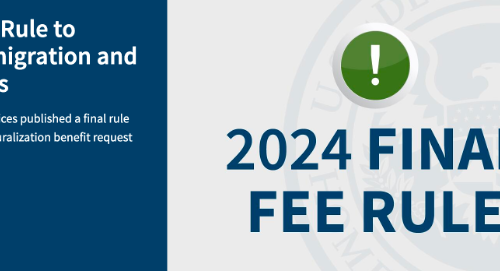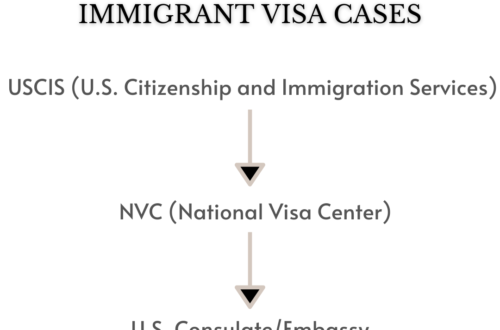-
USCIS Filing Fees Changing on April 1, 2024
On January 30, 2024, USCIS made this official by releasing a final rule that will result in a change of certain filing fees. Although some fees are going down, many are going up. A change in fees hasn’t occurred since 2016. USCIS says that this change will help improve efficiency, reduce backlogs), and ensure that applications are timely processed. You can read the full USCIS announcement here. Currently, the filing fee for filing a marriage-based adjustment of status green card application is $1760 for everything (petition, green card application, work permit application, and travel document). Starting April 1, 2024, the filing fees will be as follows depending on if you…
-
Pilot Program to Allow for Renewals of H-1B Visas Inside the U.S. to Start in January 2024
The U.S. State Department is set to launch a pilot program starting in January 2024 that will allow 20,000 H-1B workers to renew their H-1B visas in the U.S. by mail instead of having to travel to a U.S. Consulate abroad. The purpose of this program is to reduce the wait times that H-1B workers experience when they have to travel abroad to get a new H-1B visa in their passports because of the long wait times at the U.S. consulates in some countries. The agency wants to ensure this program will work before they decide to expand it. When H-1B workers are granted H-1B visas by a U.S. consular…
-
Updates on U.S.-Mexico Border Changes Since Title 42 Has Expired
With the expiration of Title 42, a rule that allowed officials to turn away migrants due to the COVID-19 pandemic, the United States government has implemented new measures regarding immigration at the U.S.-Mexico border. They will use a faster process called expedited removal to deport migrants quickly. Expedited removal is the quick deportation of migrants who do not qualify for asylum or other forms of relief to stay in the United States. For migrants who do to reach the southern U.S. border, additional regulations have been put in place. They are now required to schedule an appointment using the CBP One phone app to claim asylum. Also, if they failed…
-
The Dignity Act of 2023: A New Immigration Bill Explained
Representative Maria Elvira Salazar (R-Florida) introduced this immigration bill in the House of Representatives on May 23, 2023. This bill was created by both Democrats and Republicans to address various aspects of immigration law in the United States. It addresses border security, border infrastructure, grants legal status to undocumented immigrants already living in the United States with the possibility of getting citizenship, establishes new pathways for asylum seekers, and creates new legal pathways for economic migrants and unaccompanied minors. Below is a summary of the bill. Border Security: The bill would provide funds for upgrading technology and equipment used by the US Customs and Border Patrol (CBP). This includes things like…
-
What to Know About the New Florida Law that Will Limit Land Ownership in that State by People From Certain Countries
On May 8, 2023, the Governor of Florida, Ron DeSantis, approved a new law called Florida Senate Bill SB 264 (FL 264) that will limit land ownership in Florida by foreign nationals from certain countries. The law will go into effect on July 1, 2023, unless there is a legal delay because lawsuits have already been filed. This law places strict rules on who can own land in Florida. People from certain countries like China, Venezuela, Syria, Russia, Iran, North Korea, and Cuba cannot own agricultural land in Florida or any land within 10 miles of a military base or important infrastructure. However, U.S. citizens and permanent residents are not…
-
What You Need to Know About the New Law in Florida (FL 1718) that Affects Undocumented Immigrants
On May 9, 2023, Florida Governor Ron DeSantis signed Senate Bill 1718 (FL 1718) into law. This law is an effort to make it harder for undocumented immigrants to live and work in Florida. Here’s a summary of the law, which will take effect on July 1, 2023: FL 1718 is a new law in Florida that will make it harder for undocumented individuals to live and work in the state. It has rules about transporting people, collecting information at hospitals, checking employment status, and getting licenses. While the full impact of this law is not yet known, it is expected to have a big effect on Florida’s economy.
-
K-1 Fiancé(e) Visa and Protection Under the Violence Against Women Act (VAWA)
In this post, we will explore two special cases in family-based immigration: fiancé(e) visas and protection under the Violence Against Women Act (VAWA). If you are a U.S. citizen and engaged to a foreign national, you can file a fiancé(e) petition, so your fiancé(e) can get a visa to come to the U.S., also known as the K-1 visa. This visa allows your fiancé(e) to enter the U.S., and you would have to get married within 90 days of your fiance(e) arriving in the U.S. To apply for a K-1 visa, the U.S. citizen petitioner must first file a Form I-129F, Petition for Alien Fiancé(e), with the USCIS. Once the…
-
What Your Obligations Are As An I-864 Financial Sponsor of An Immigrant
As an I-864 sponsor, you are financially responsible for the immigrant you are sponsoring. This means that if the immigrant receives certain means-tested public benefits or becomes dependent on the government for support, you may be required to reimburse the government for the cost of those benefits. A means-tested public benefit is a type of government assistance program that is based on a person’s income or financial resources. Examples of means-tested public benefits include Medicaid, Supplemental Nutrition Assistance Program (SNAP), Temporary Assistance for Needy Families (TANF), and Supplemental Security Income (SSI). When an immigrant receives means-tested public benefits, it can affect the financial responsibility of the I-864 sponsor. If the…
-
Can Working Without Authorization In the U.S. Prevent You From Getting A Green Card?
Working without authorization in the United States is a serious violation of U.S. immigration law, and can lead to you not being able to get a green card in the future. However, if you are married to a U.S. citizen and you’re getting your green card through your marriage, or you’re an “immediate relative” of a U.S. citizen, you can be forgiven for working without authorization assuming you did not claim to be a U.S. citizen when you applied for the job. This scenario comes up all the time with my clients, and it’s always something they worry and ask about, but the immigration laws actually automatically forgive this if…
-
The Green Card Process for Foreign Workers
I’ve met with many employers with the same issue – they are having a hard time finding workers. One potential solution is petitioning for foreign workers to fill those jobs. The process works and can fill a range of jobs from landscapers to cooks to hotel workers to tech jobs and everything in between. However, the caveat is that it will take time, and it can take even longer depending on where the foreign worker was born (nationals from India can end up waiting almost 10 years for a green card through an employer). My answer to employers who say that they need workers now and cannot wait long is…



























